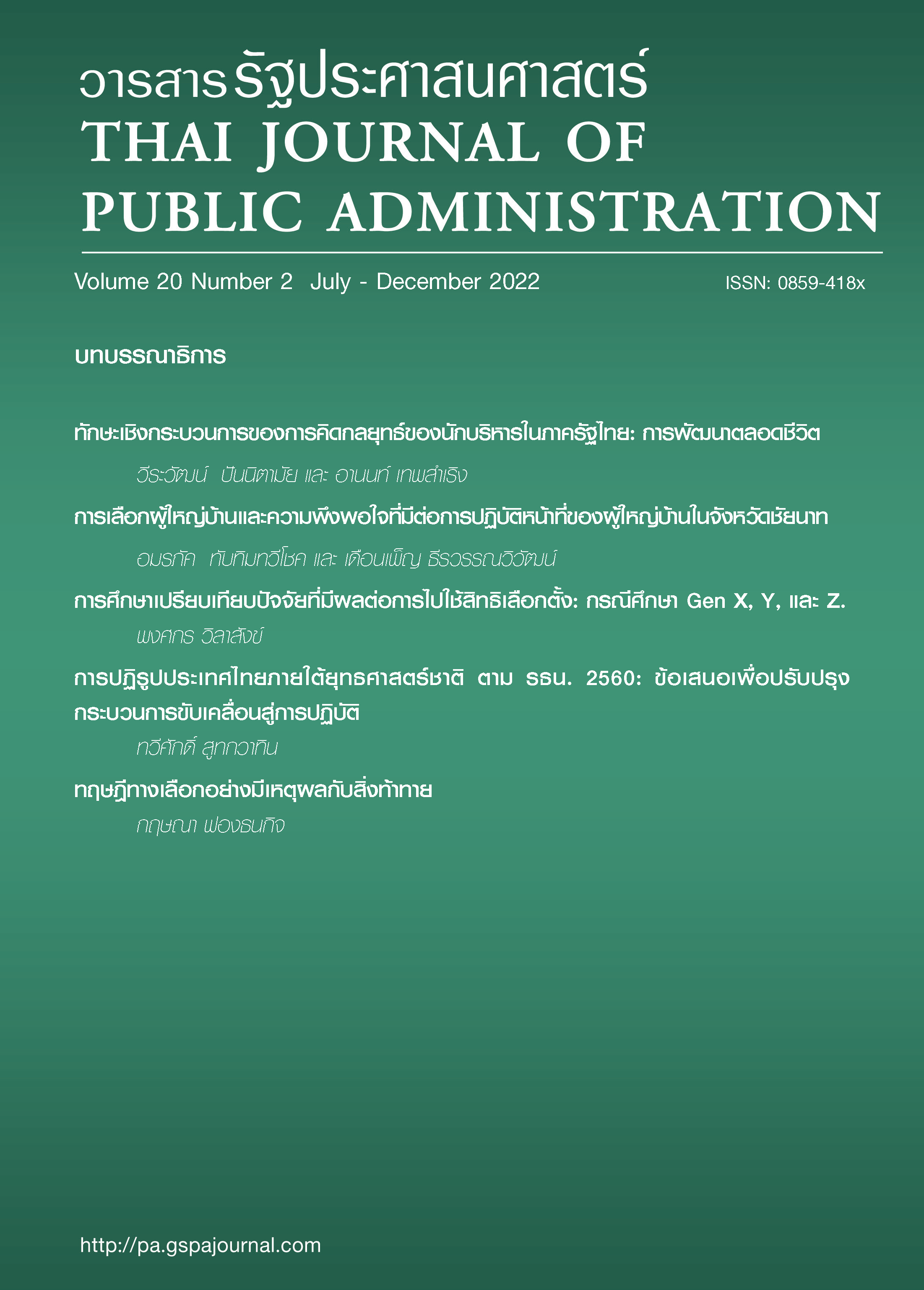ทฤษฎีทางเลือกอย่างมีเหตุผลกับสิ่งท้าทาย
คำสำคัญ:
ทฤษฎีทางเลือกอย่างมีเหตุผล, พฤติกรรม, โรคระบาดโควิด-19บทคัดย่อ
ทฤษฎีทางเลือกอย่างมีเหตุผลมีพัฒนาการมาอย่างยาวนานหลายทศวรรษ เป็นทฤษฎีที่อธิบายพฤติกรรมเชิงเศรษฐกิจและสังคม โดยมีสมมติฐานว่า “ปัจเจกชนจะทำการวิเคราะห์ต้นทุนและผลประโยชน์เพื่อพิจารณาทางเลือกที่ดีที่สุด ด้วยการกระทำที่มีเหตุผล” บทความนี้นำเสนอข้อคิดเห็นของนักคิดต่างทฤษฎีและสิ่งท้าทายต่อทฤษฎีทางเลือกด้วยสถานการณ์โรคระบาดโควิด-19
เอกสารอ้างอิง
Acheson, J. M. (2002). Rational choice, cultural change, and fisheries management in the gulf of Maine. Research in Economic Anthropology, 21. 133-159.
Alexander, J. M. (2021). Evolutionary Game Theory. Stanford Encyclopedia of Philosophy (Summer 2021 Edition). Retrieved from https://plato.stanford.edu/archives/sum2021/entries/game-evolutionary/.
Amadae, S. M., & De Mesquita, B. B. (1999). The rochester school: The origins of positive political theory. Annual Review of Political Science, 2, 269-295.
Arrow, K. J. (1951). Social Choice and Individual Values. New York: John Wiley and Sons.
Bhattacharya, J., Chakraborty, S., & Yu, X., (2021). A rational-choice model of Covid-19 transmission with endogenous quarantining and two-sided prevention. Journal of Mathematical Economics, 93.
Bollig, M. (1998). Moral economy and self-interest: Kinship, friendship, and exchange among the Pokot (N.W. Kenya). In Schweizer, T., & White, D. R. (Eds.). Kinship, Networks, and Exchange. Cambridge: Cambridge University Press.
Castex, G., Dechter, E., & Lorca, M. (2020). COVID-19: Cross-country heterogeneity in effectiveness of non-pharmaceutical interventions. Covid Economics, 14(6), 175-199.
Chudik, A., Pesaran, M. H., & Rebucci, A. (2020). Voluntary and mandatory social distancing: Evidence on covid-19 exposure rates from Chinese provinces and selected countries. Covid Economics, 15(7), 26-62.
Daumann, F., & Follert, F. (2020). COVID-19 and rent-seeking competition: Some insights from Germany. New Perspectives on Political Economy, 16(1-2), 52-69.
de Jonge, J. (2012). Rethinking Rational Choice Theory: A Companion on Rational and Moral Action. London: Palgrave Macmillan.
Department of Environmental Quality Promotion. (B.E.2557). Khan Suksa Pattana Naew Tang Khan Lod Chai San Kemee Nai Khan Kaset Due Khabuankhan Wichai Bab Mee Suanluam: Koranee Suksa Amphoe Mae Taeng Changwat Chaing Mai. Bangkok: Department of Environmental Quality Promotion.
Downs, A. (1957). An Economic Theory of Democracy. New York: Harper and Row.
Elster, J. (1989). Social norms and economic theory. Journal of Economic Perspectives, 3(4), 99-117.
Erikson, S. (2020). Pandemics show US what government is good for. Nature Human Behaviour, 4, 441-442.
Friedman, M. (1953). Essays in Positive Economics. Chicago and London: The University of Chicago Press.
Fukuyama, F. (2020). The thing that determines a country’s resistance to the coronavirus. The Atlantic. Retrieved February 15, 2022 from https://www.theatlantic.com/ideas/archive/2020/03/thing-determines-how-well-countries-respond-coronavirus/609025/.
Genzen, J. R. (2019). Regulation of laboratory-developed tests: A clinical laboratory perspective. American Journal of Clinical Pathology, 152(2), 122-131.
Granato, J., Lo, M., & Wong, M. C. S. (2005). The Empirical Implications of Theoretical Models (EITM): A Framework for Methodological Unification. the annual meeting of the Southern Political Science Association. January 6-8, 2005 in New Orleans, Louisiana.
Green, D. P., & Shapiro, I. (1994). Pathologies of Rational Choice Theory: A Critique of Applications in Political Science. New York: Yale University Press.
Kahneman, D., & Tversky, A. (2003). Choices, Values, and Frames. New York: Cambridge University Press.
Kavanamur, D., Okole, H., Manning, M., & Levantis, T. (2005). Understanding reform in Papua New Guinea. Pacific Economic Bulletin. 20(1).
Lakoff, G., & Johnson, M. (1999). Philosophy in the Flesh: The Embodied Mind and Its Challenge to Western Thought. New York: Basic Books.
Levin, J., & Milgrom, P. (2004). Introduction to Choice Theory. Retrieved from https://web.stanford.edu/~jdlevin/Econ%20202/Choice%20Theory.pdf.
MacDonald, P. K. (2003). Useful fiction or miracle maker: The competing epistemological foundations of rational choice theory. American Political Science Review, 97(4), 551-565.
Mérieau, E. (2020). COVID-19, Authoritarianism VS. Democracy: What the Epidemic Reveals about the Orientalism of Our Categories of Thought. Sciences Pro Center for International Study, Le Monde, Le Figaro, France Info, France Culture, and France Inter.
Olson, M. (1965). The Logic of Collective Action. Cambridge: Harvard University Press.
Scott, J. (2000). Rational Choice Theory.
Simon, H. A. (1979). Models of Thought, Vols. 1 and 2. Yale University Press.
Wittek, R. (2013). Rational choice. In McGee, R. J., & Warms, R. L. (Eds.). Theory in Social and Cultural Anthropology: An Encyclopedia. Thousand Oaks, CA: SAGE Publications Inc.
Yesuf, M., & Bluffstone, R. (2009). Poverty, risk aversion, and path dependence in low-income countries: Experimental evidence from Ethiopia. American Journal of Agricultural Economics, 91(4), 1022-1037.
Zweifel, P. (2020). The COVID-19 crisis: A public choice view. Economic Affairs, 40(3), 395-405.
ดาวน์โหลด
เผยแพร่แล้ว
รูปแบบการอ้างอิง
ฉบับ
ประเภทบทความ
สัญญาอนุญาต

อนุญาตภายใต้เงื่อนไข Creative Commons Attribution-NonCommercial-NoDerivatives 4.0 International License.



